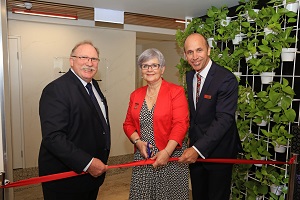Upstart’s takeover foray stuns hotel industry
Marriott International and Starwood Hotels & Resorts Worldwide announced at separate special shareholder meetings on April 8, that the stockholders of both companies approved proposals relating to Marriott’s acquisition of Starwood, which will create the world’s largest hotel company. The parties have cleared the pre-merger antitrust review in the United States and Canada and multiple other jurisdictions.
Marriott thought they had the buyout of Starwood in the bag late last year, then out of the woodwork came Anbang with a better unsolicited offer. Marriott eventually won the tug-of-war after a series of financial one-upmanships but only when Anbang pulled out after seemingly winning the love triangle battle.
But who is Anbang?
The Chinese firm Anbang Insurance Group has gone from one-time sleepy provincial car insurer to an aggressive buyer of insurance companies and property assets across Europe and the US in little more than a decade.
Anbang is one of the largest insurance groups in China, offering various kinds of insurance and financial products. According to its website, the firm opened its first branch in 2004 and now has 3000 branches in 31 provinces around China, serving more than 35 million clients. Anbang said it has more than 30,000 employees around the globe. Yet it only has a fairly small 3.6 percent market share among domestic insurers in China, although the company has improved its position in the past year by offering customers policies with better returns than its competitors.
In recent years, Anbang has been on a buying spree, acquiring – among other things – the Waldorf Astoria New York hotel for $1.95 billion last year (and tying Hilton into a 100-year contract to manage it!) as well as insurance companies in South Korea, Belgium and the Netherlands. Anbang also has agreed to buy US insurer Fidelity & Guaranty Life for $1.57 billion. Anbang also agreed to buy Strategic Hotels & Resorts for $6.5 billion from investment company Blackstone Group. Blackstone bought the company for $500 million less only three months earlier. It was a nice deal for Blackstone but one wonders why Anbang would pay so much more only a few months later.
On November 16, 2015, Bathesda, Maryland-based Marriott International made a merger bid for Stamford, Connecticut-based Starwood Hotels & Resorts at what amounted to US$12.2 billion in what would have created the world’s largest hospitality company with more than 5500 hotels and 1.1 million rooms worldwide.
As is now history, Anbang’s consortium (with JC Flowers and Primavera Capital) outbid Marriott with a $14.4 billion offer. Marriott retaliated with a $15 billion counter proposal only to have Anbang trump this and then, suddenly, walk away from the deal.
A key factor in the Anbang offer was it would be an “all cash takeover” rather than a straight shareholder deal. The cash is important here. It’s what made the Anbang offer so desirable to Starwood shareholders. That, and the perception that such an arrangement would allow Starwood to continue on its same path while gaining some advantage in Chinese markets. But the cash also could be one explanation for why Anbang pulled out.
It seems Anbang reportedly submitted three unsuccessful bids for Starwood on previous occasions but finally pulled out of the dealings altogether when Starwood pressed for further details about financing.
In the later bid it seems that the China Insurance Regulatory Commission may have intervened because Chinese insurers can’t invest more than 15 percent of their assets abroad. That would have been a problem for Anbang that had already paid $2 billion for the Waldorf Astoria New York and promised Blackstone Group $6.5 billion for Strategic Hotels & Resorts. Public records show the 11-year-old insurance and investment company has spent almost $7 billion on foreign acquisitions since 2014.
However, Anbang may have an out: much of Anbang’s funds come from sales of what in China are called wealth-management products, investments that pay higher returns than bank deposits. Funds from such financial products have outstripped fundraising from its namesake insurance businesses in recent months. That may take it out of the China Insurance Regulatory Commission’s authority.
 Whatever, the fascinating love triangle between Anbang chairman Wu Xiaohui up against Marriott chief executive officer Arne Sorenson with the wooed Thomas Mangas, CEO of Starwood, in the middle, certainly kept the industry enthralled in the soap opera.
Whatever, the fascinating love triangle between Anbang chairman Wu Xiaohui up against Marriott chief executive officer Arne Sorenson with the wooed Thomas Mangas, CEO of Starwood, in the middle, certainly kept the industry enthralled in the soap opera.
Nothing to do with all of the above of course, Anbang’s chairman Wu Xiaohui is said to enjoy warm relations with the Beijing government. His wife is the granddaughter of Deng Xiaoping, the former leader of China.
So what does Anbang do now for investment? InterContinental Hotels Group?

AccomNews is not affiliated with any government agency, body or political party. We are an independently owned, family-operated magazine.





